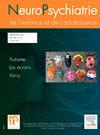Aspects relationnels impliqués dans l’efficacité des psychotropes chez l’enfant et l’adolescent : modèles théoriques, illustrations cliniques, recommandations
Q4 Medicine
Neuropsychiatrie de l''Enfance et de l''Adolescence
Pub Date : 2025-09-01
DOI:10.1016/j.neurenf.2025.04.002
引用次数: 0
Abstract
Objectives
This article examines how relational aspects contribute to the effectiveness of prescribing psychotropic drugs to children and adolescents. This psychological component is often referred to as the “placebo effect” or “non-specific effects” in clinical research.
Method
This narrative review synthesizes data from epidemiological studies, clinical trials, and experimental psychology regarding the relational factors that influence response levels to psychotropic medications in the pediatric population.
Results
The literature findings have been integrated into a theoretical model inspired by systems theory and developmental psychology. This interactionist model emphasizes the connections between the pre-existing perceptions of medication held by parents and children, and how these perceptions influence their beliefs and attitudes toward medication.
Discussion
Representations of medication are shaped by developmental issues and parental life experiences. These factors can be addressed during consultations to mitigate their effects. The prescriber has a crucial role in acknowledging these representations and assisting in their interpretation. Clinical examples are provided to illustrate how these representations manifest during treatment.
Conclusions
Guidelines for best practices must consider the significance of relational factors at every stage of prescribing psychotropic medications to children and adolescents to optimize their therapeutic effects.
与儿童和青少年精神药物疗效相关的关系方面:理论模型、临床插图、建议
目的探讨关系因素如何影响儿童和青少年精神药物处方的有效性。在临床研究中,这种心理成分通常被称为“安慰剂效应”或“非特异性效应”。方法综合流行病学研究、临床试验和实验心理学数据,探讨影响儿童对精神药物反应水平的相关因素。结果在系统论和发展心理学的启发下,将文献研究成果整合为理论模型。这种互动模式强调父母和孩子对药物的预先认知之间的联系,以及这些认知如何影响他们对药物的信念和态度。药物的表现是由发育问题和父母的生活经历决定的。这些因素可在协商期间加以处理,以减轻其影响。处方者在承认这些陈述并协助其解释方面起着至关重要的作用。提供了临床实例来说明这些表征如何在治疗期间表现出来。结论最佳实践指南应在儿童和青少年精神药物处方的各个阶段考虑相关因素的重要性,以优化其治疗效果。
本文章由计算机程序翻译,如有差异,请以英文原文为准。
求助全文
约1分钟内获得全文
求助全文
来源期刊

Neuropsychiatrie de l''Enfance et de l''Adolescence
Medicine-Pediatrics, Perinatology and Child Health
CiteScore
0.60
自引率
0.00%
发文量
61
期刊介绍:
Organ of the Société française de psychiatrie de enfant et de adolescent, Neuropsychiatrie de enfance et de adolescence tackles all fields of child-adolescent psychiatry and offers a link between field and clinical work. As a reference and training tool for students and practitioners, the journal publishes original papers in child psychiatry as well as book reviews and conference reports. Each issue also offers a calendar of the main events dealing with the speciality.
 求助内容:
求助内容: 应助结果提醒方式:
应助结果提醒方式:


